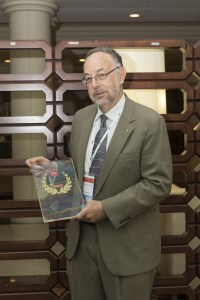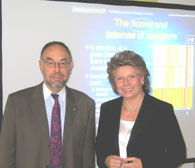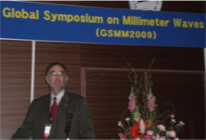
Keynote speaker, PIMRC2009 Tokyo Japan
Qualifications to Help You
• Pioneer of spread spectrum commercialization 1981-85

FCC Approval of Docket 81-413 Rules that Formed the Basis of Wi-Fi and Bluetooth, 5/9/85
"Dr. Michael Marcus for over 20 years has been a forceful proponent of new technology at FCC. His most significant achievement in the early eighties when he single-handedly championed the formulation of rules for spread spectrum modulation and multiple access, against conventional but misguided wisdom regarding the efficiency and manageability of this technology. A consequence of his success has been the proliferation of mobile personal communications both with terrestrial base stations and satellite transponders. It now appears likely that the majority of personal communications will eventually employ commercial spread spectrum CDMA, which would not have appeared possible even ten years ago, but for the pioneering vision of Dr. Marcus." Andrew Viterbi, Cofounder of Qualcomm, 2003
"But the FCC, prompted by a visionary engineer on its staff, Michael Marcus, took three chunks of spectrum from the ISM bands (spectrum now used for WiFi and Bluetooth) and opened them up to communications engineers" The Economist, June 12, 2004, p. 26
Awarded first IEEE-USA Electrotechnology Transfer Award, 1994 "For his pioneering work in the conception, drafting, and enactment of the Federal regulations that legalized commercial spread spectrum radio under FCC Part 15, the rules governing unlicensed devices; thus spawning a multimillion dollar, worldwide, wireless industry."
Awarded IEEE Communications Society Award for Public Service in the Field of Telecommunications, 2013. This award recognizes individuals who have made major contributions to the public welfare through their work in the field of telecommunications. Recipients have played major roles establishing public policy in the both the legislative and executive branches of government and in the standards arena. “For pioneering spectrum policy initiatives that created modern unlicensed spectrum bands for applications that have changed our world.”
"But the FCC, prompted by a visionary engineer on its staff, Michael Marcus, took three chunks of spectrum from the ISM bands (spectrum now used for WiFi and Bluetooth) and opened them up to communications engineers" The Economist, June 12, 2004, p. 26
Awarded first IEEE-USA Electrotechnology Transfer Award, 1994 "For his pioneering work in the conception, drafting, and enactment of the Federal regulations that legalized commercial spread spectrum radio under FCC Part 15, the rules governing unlicensed devices; thus spawning a multimillion dollar, worldwide, wireless industry."
Awarded IEEE Communications Society Award for Public Service in the Field of Telecommunications, 2013. This award recognizes individuals who have made major contributions to the public welfare through their work in the field of telecommunications. Recipients have played major roles establishing public policy in the both the legislative and executive branches of government and in the standards arena. “For pioneering spectrum policy initiatives that created modern unlicensed spectrum bands for applications that have changed our world.”

First inductee into Wi-Fi NOW Hall of Fame April 2017:
“If it weren’t for him, we could simply not be here discussing Wi-Fi today. In fact, there would be no Wi-Fi because Wi-Fi – or WLAN – would not even have band to operate it.
He is the Founding Father of the ISM bands, and thus laid the groundwork for rules for bands that would become the operating bands of Wi-Fi & Bluetooth. This was in 1985. More than that, he’s also widely responsible for the FCCs adoption of rules for the 60 GHz mmWave bands that were approved in 1995.”
“If it weren’t for him, we could simply not be here discussing Wi-Fi today. In fact, there would be no Wi-Fi because Wi-Fi – or WLAN – would not even have band to operate it.
He is the Founding Father of the ISM bands, and thus laid the groundwork for rules for bands that would become the operating bands of Wi-Fi & Bluetooth. This was in 1985. More than that, he’s also widely responsible for the FCCs adoption of rules for the 60 GHz mmWave bands that were approved in 1995.”
• Pioneer of millimeterwave commercialization 1992-2003

• Education in engineering with strong experience in legal and economic issues key to practical spectrum policy

Special Advisor to
Mrs. Viviane Reding
European Commissioner for Information Society & Media
2006

Consultant to Infocomm Development Authority of Singapore (IDA)
2010
Engineering:
• Doctorate in electrical engineering from MIT
• FCC Engineer of the Year award 1990
• Chair IEEE-USA Committee on Communications Policy (2011-2013)
• Associate Editor, IEEE Wireless Communications and author of regular column on spectrum policy
Legal:
• Author of many key breakthrough FCC legal decisions in spectrum policy, for example
• Founding co-chair of Engineering and Technology Practice Committee of Federal Communications Bar Association and 2011-13 co-chair
• 6 month experience at State Department Office of Japanese Affairs implementing US-Japan cooperation agreements
• Have drafted comments to FCC on key technical policy issues 1 2 3
•Author of published article on Japanese public comment procedures
[Not licensed to practice law]
Economic:
• Frequent presenter and session chair at Telecommunications Policy Research Conference, the key US conference on economic aspects of telecommunications policy, for example
Academic:
Former Professorial Lecturer, George Washington University, Department of Electrical Engineering
Former Visiting Associate Professor, MIT, Department of Electrical Engineering and Computer Science, Department of Political Science, Sloan School of Management
Adjunct Professor, Virginia Tech, Department of Electrical and Computer Engineering
• Doctorate in electrical engineering from MIT
• FCC Engineer of the Year award 1990
• Chair IEEE-USA Committee on Communications Policy (2011-2013)
• Associate Editor, IEEE Wireless Communications and author of regular column on spectrum policy
Legal:
• Author of many key breakthrough FCC legal decisions in spectrum policy, for example
• Founding co-chair of Engineering and Technology Practice Committee of Federal Communications Bar Association and 2011-13 co-chair
• 6 month experience at State Department Office of Japanese Affairs implementing US-Japan cooperation agreements
• Have drafted comments to FCC on key technical policy issues 1 2 3
•Author of published article on Japanese public comment procedures
[Not licensed to practice law]
Economic:
• Frequent presenter and session chair at Telecommunications Policy Research Conference, the key US conference on economic aspects of telecommunications policy, for example
Academic:
Former Professorial Lecturer, George Washington University, Department of Electrical Engineering
Former Visiting Associate Professor, MIT, Department of Electrical Engineering and Computer Science, Department of Political Science, Sloan School of Management
Adjunct Professor, Virginia Tech, Department of Electrical and Computer Engineering
• Key roles in FCC Spectrum Policy Task Force
• Responsible for drafting FCC proposals for cognitive radio
• 25 year veteran of FCC spectrum management with an exchange assignment (Mike Mansfield Fellowship) in Japanese spectrum regulator - MPT (Now MIC) Radio Department
Also visiting researcher at University of Tokyo, Keio University, and Communications Research Laboratory (Now NICT)
• Frequent visitor and speaker in Japan on radio technology and spectrum policy
More than 15 presentations at Japanese technical conferences
• Invited keynote speaker at wireless conferences around the world:
• Responsible for drafting FCC proposals for cognitive radio
• 25 year veteran of FCC spectrum management with an exchange assignment (Mike Mansfield Fellowship) in Japanese spectrum regulator - MPT (Now MIC) Radio Department
Also visiting researcher at University of Tokyo, Keio University, and Communications Research Laboratory (Now NICT)
• Frequent visitor and speaker in Japan on radio technology and spectrum policy
More than 15 presentations at Japanese technical conferences
• Invited keynote speaker at wireless conferences around the world:

- EMC Zurich, Zurich Switzerland 2005
- International Conference on Ultrawideband, Zurich, Switzerland 2005
- International Symposium on Medical Information and Communications Technology, Yokohama, Japan 2006
- Global Symposium on Millimeterwave, Sendai, Japan 2009
- NIWeek Wireless Track, Austin Texas 2009
- Personal, Indoor and Mobile Radio Communications Conference (PIMRC09) Tokyo, Japan 2009
- CHINACOM 2015, Shanghai China 2015
- International Symposium on Medical Information and Communications Technology, Worcester, MA, 2016
Video archive of spectrum leadership
Creating the unlicensed ISM bands and the basic rules for what would become Wi-Fi, Bluetooth, and Zigby
1981 proposals
1985 adoption of rules
Below are the remarks of Vic Hayes, founding chairman of IEEE 802.11, receiving 2013 Lovie Lifetime Achievement Award. (Lovie, named after Ada Lovelace, is the only pan-European Award to honor the entire breadth of content created for the internet.) See remarks starting at 2:30 on video about origins of Wi-Fi.
Millimeterwave rulemaking that created 60 GHz unlicensed band:
(Thought by some to have been the stimulus of the R&D that ultimately led the way became millimeterwave 5G.)
1994 proposals
1995 adoption of rules
